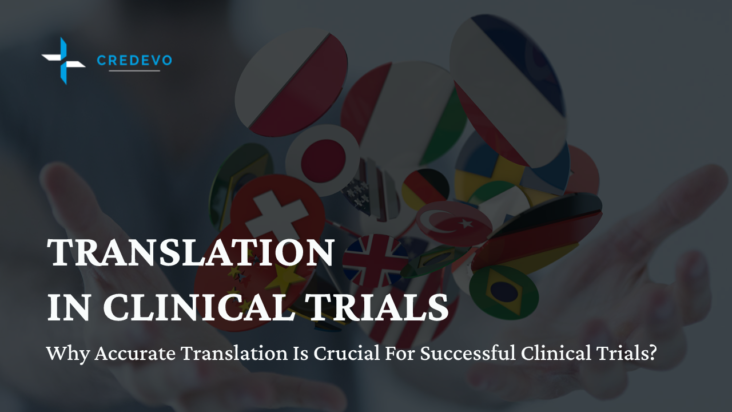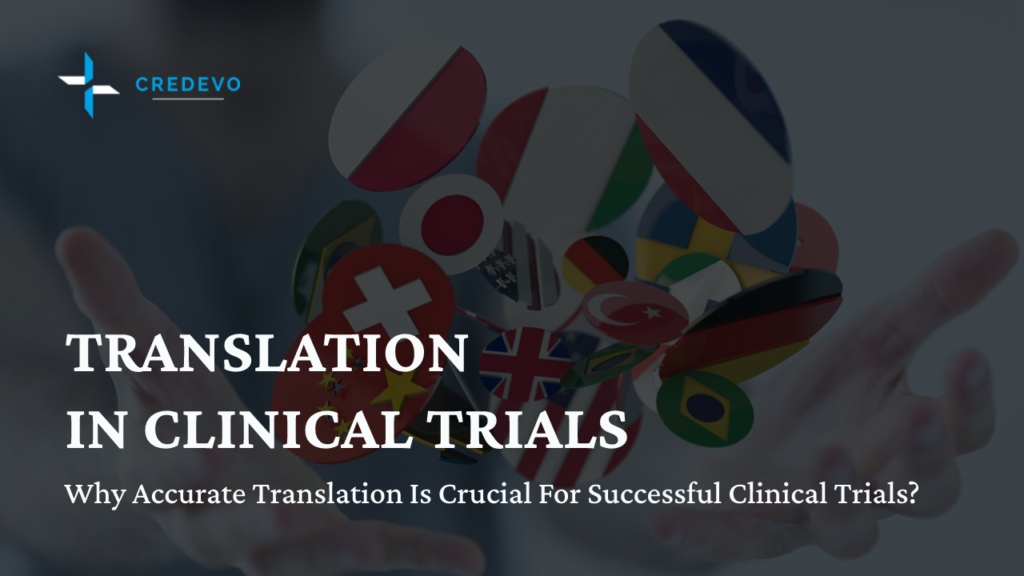Why Accurate Translation Is Crucial For Successful Clinical Trials?

Accurate translation is essential for successful clinical trials. It ensures that participants understand the study procedures, risks, benefits, and potential adverse events. Inaccurate translation can lead to misunderstandings that impact the validity of study results.

Accurate translation of study documents is crucial for consistency and minimizing errors during data collection and analysis. Regulatory non-compliance with translation requirements can delay approvals, compromise patient safety, and result in unsuccessful clinical trials.
The importance of accurate translation in clinical trials
Before discussing the importance, let’s examine a case study that emphasizes the significance of accurate translation of clinical trial documents.
A case study
In 2003, researchers conducted a clinical trial in the UK to test the potential of the treatment for treating autoimmune diseases and leukemia. During the phase 1 clinical trial, all six healthy volunteers who received the drug experienced severe adverse reactions, including multiple organ failure and life-threatening cytokine release syndrome. The medical staff hospitalized the volunteers and provided them with intensive care treatment for several weeks.
It was later discovered that the German-based pharmaceutical company that developed the drug had used a French translation of the informed consent form for the UK trial. The translation was inaccurate and did not adequately convey the risks of the drug. For example, the translation used the word “inflammation” instead of “cytokine storm,” which led the volunteers to underestimate the severity of the potential side effects.
This case study highlights the importance of accurate translation in clinical trials. Inaccurate translation can lead to misunderstandings and misinterpretations of important information, such as the risks and benefits of participating in a clinical trial.
After understanding the importance of translation services in this case study, let’s explore other reasons why translation is important in clinical trials.
The significance of accurate translation in clinical trials
Ensures the reliability and validity of trial data
Accurate translation is essential to ensure that trial data are reliable and valid. Inaccurate translation can lead to misunderstandings and misinterpretations of important information, such as the risks and benefits of participating in a clinical trial or the meaning of clinical endpoints. This can result in misleading results, which can have serious consequences for patients and public health.
Protects the safety and well-being of trial participants
Accurate translation is necessary to ensure that trial participants fully understand the risks and benefits of participating in a clinical trial. Inaccurate translation can lead to trial participants underestimating the risks, which can lead to harm or even death. Accurate translation also ensures that trial participants can provide informed consent to participate in the trial.
Addresses the unique translation challenges in clinical trials
Clinical trials involve specialized medical terminology and complex scientific concepts that require specialized translation skills. Accurate translation requires translators who are fluent in both the source and target languages, as well as have expertise in the relevant medical field. Cultural differences also need to be taken into account to ensure that the translated material is culturally appropriate.
Complies with regulatory requirements
Accurate translation is necessary to comply with regulatory requirements in clinical trials. Regulatory agencies such as the International Council for Harmonisation of Technical Requirements for Pharmaceuticals for Human Use (ICH) and the U.S. Food and Drug Administration (FDA) require accurate translations of clinical trial documents, including informed consent forms, study protocols, and case report forms. Non-compliance with regulatory requirements can lead to regulatory issues and delays in the approval process.
Do you need support for translation in your clinical trials, regulatory affairs, or business development? Write to us at [email protected] or provide your details below to connect with us and get expert support.
Along with the importance of translation services, there are also some challenges in translation for clinical trials.
Translation challenges in clinical trials
Translation challenges in clinical trials are numerous and complex. Here are some of the main challenges that arise:
Medical terminology
Clinical trials involve specialized medical terminology that may not have an equivalent in the target language. This can make it challenging to find a suitable translation or to ensure that the translation accurately conveys the intended meaning.
Cultural differences
Cultural differences can pose challenges for translation in clinical trials. Translators need to be aware of cultural nuances that may affect how the translated material is perceived by trial participants. For example, certain words or phrases may have different connotations in different cultures.
Patient-reported outcomes (PROs)
PROs are an important part of clinical trials, but they can be challenging to translate accurately. PROs are often subjective and rely on the patient’s interpretation of their symptoms, which can be influenced by cultural and linguistic factors.
Informed consent forms
Informed consent forms are a critical part of the clinical trial process, and accurate translation is essential to ensure that trial participants fully understand the risks and benefits of participating. However, informed consent forms can be lengthy and complex, which can make translation challenging.
Back-translation and reconciliation
Back-translation is a process in which a translated document is translated back into the source language to check for accuracy. Reconciliation involves resolving any discrepancies between the back-translation and the original document. Back-translation and reconciliation are important quality control measures in translation, but they can be time-consuming and expensive.
Regulatory requirements
Regulatory agencies such as the U.S. Food and Drug Administration and the European Medicines Agency (EMA) have strict requirements for translation in clinical trials. Translated documents must be accurate, complete, and comply with regulatory requirements.
Best practices for translation in clinical trials
Here are some best practices for translation in clinical trials:
Use professional translators with subject matter expertise
Professional translators who have experience in the medical field and are fluent in both the source and target languages are essential for accurate translation. Translators with subject matter expertise can ensure that the translated material is not only accurate but also scientifically and culturally appropriate.
Conduct a linguistic validation process
Linguistic validation is a process that involves translating patient-reported outcomes (PROs) and other clinical trial documents into the target language and then validating them with native speakers of the target language. The goal of linguistic validation is to ensure that the translated documents are culturally appropriate and that they convey the same meaning as the original documents.
Use a translation memory system
A translation memory system is a software tool that stores previously translated text segments for future use. Using a translation memory system can improve translation consistency and reduce the time and cost of translation.
Follow regulatory requirements
Regulatory agencies such as the International Council for Harmonisation of Technical Requirements for Pharmaceuticals for Human Use (ICH) and the U.S. Food and Drug Administration (FDA) have strict requirements for translation in clinical trials. It is important to follow these requirements to ensure compliance and avoid regulatory issues.
Conduct quality control measures
Quality control measures such as back-translation and reconciliation can help ensure the accuracy and consistency of the translated material. It is also important to have a review process in place to catch any errors or inconsistencies in the translated material.
Use technology to streamline the translation process
Technology can help streamline the translation process and reduce the time and cost of translation. For example, machine translation and natural language processing tools can be used to automate certain aspects of translation, such as the translation of large volumes of text.
What are the Regulatory considerations for translation in clinical trials?
There are several regulatory considerations for translation in clinical trials. The main purpose of these regulations is to ensure that the translation process is accurate, consistent, and reliable. Here are some of the key considerations:
- Informed consent forms (ICFs): Informed consent is a critical component of clinical trials, and ICFs must be provided in a language that the participant can understand. The translation process must be accurate and culturally appropriate.
- Study protocols: Study protocols must be translated into the local language for sites located in non-English speaking countries. The translated version must be consistent with the original protocol and include all necessary details.
- Case report forms (CRFs): CRFs are used to collect data during the trial, and they must be available in the local language if the study is conducted in a non-English speaking country. The translated version must be consistent with the original CRF.
- Investigator’s brochure (IB): The IB is a document that provides information on the investigational product to the investigator. The IB must be available in the local language if the study is conducted in a non-English-speaking country.
- Regulatory submissions: Regulatory submissions, such as Investigational New Drug (IND) applications, must include translations of key documents in the local language.
- Translation process: The translation process must follow a standard methodology, and translations must be reviewed and approved by qualified personnel. The translator should have expertise in the subject matter and be fluent in both the source and target languages.
- Quality assurance: Quality assurance measures must be in place to ensure that translations are accurate and consistent. This may include back-translation, where the translated document is translated back into the source language to ensure accuracy.
Do you have any questions about translation in clinical trials?
If you require support or have any questions regarding clinical trial translations, please share your contact details below to connect with us and seek our services.